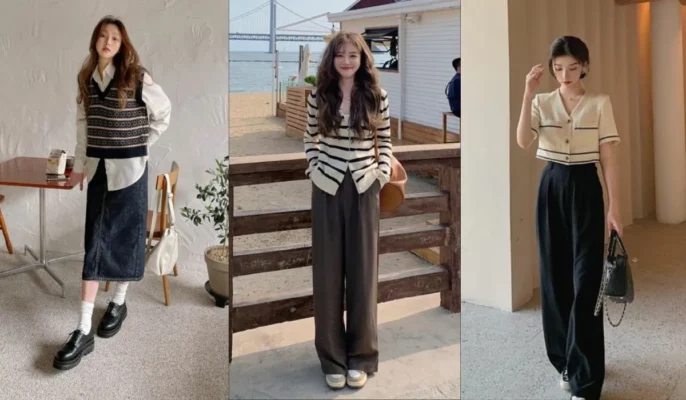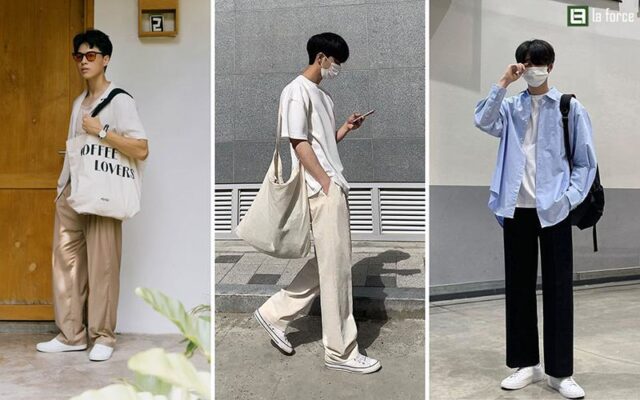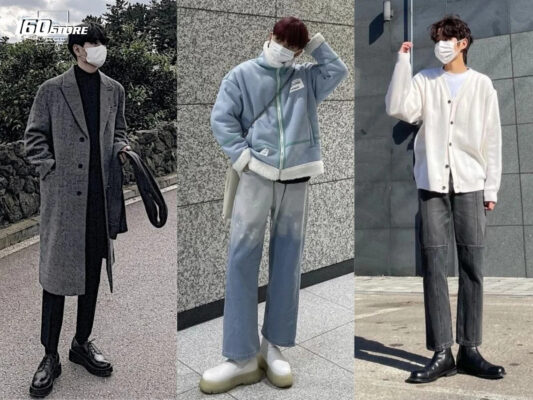Latest Fashion Trends
Korean Fashion Through the Seasons: How to Mix and Match Your Style All Year Round
Korean Fashion Through the Seasons: 5. How to Mix and Match Your Style All Year Round
Korean fashion has become a global phenomenon, recognized for its unique blend of minimalism, elegance, and attention to detail. It’s not just about looking good — it’s about expressing identity, mood, and even values through thoughtfully chosen garments. Whether you’re wandering the streets of Seoul or scrolling through Korean fashion influencers on Instagram, the country’s distinctive style evolves subtly yet purposefully with each season.
Unlike other fashion scenes that chase fast trends, Korean fashion is rooted in seasonal styling, balance, and emotional expression. Each season in Korea has a unique aesthetic and functional need, from the crisp blooms of spring to the bone-chilling winds of winter. This article explores how to build and coordinate a wardrobe that reflects Korean fashion sensibilities all year long — with deep dives into color palettes, layering strategies, fabric choices, and example outfits for each season.

The Foundations of Korean Fashion
Before diving into seasonal breakdowns, it’s helpful to understand the core principles that underpin Korean fashion:
1. Subtle Elegance
Korean fashion favors clean lines, soft silhouettes, and pieces that exude quiet confidence. Flashy logos or loud designs are less common; instead, there’s an emphasis on harmony and proportion.
2. Layering Mastery
Korean style excels at layering. Whether it’s a button-down shirt under a sleeveless dress or a cropped blazer over a long turtleneck, each layer contributes to a coherent whole.
3. Seasonal Awareness
Fashion changes with the seasons, both in fabric and form. Materials, colors, and layering techniques shift thoughtfully, matching not just the weather but also seasonal moods and themes.
4. Gender Fluidity and Soft Masculinity
In Korean menswear especially, there’s an embrace of softer tailoring, longer coats, and looser silhouettes — challenging conventional gender norms in style.
5. Balance and Proportion
Outfits are carefully balanced: oversized pieces are paired with fitted elements, and bold accessories are tempered with a neutral base.
Now, let’s explore how these principles are applied through the four Korean seasons.
Korean fashion isn’t just about aesthetics — it’s about lifestyle. It emphasizes calmness over chaos, intentionality over excess. Through each season, Korean style teaches us to adapt our wardrobes to reflect both external conditions and internal states.
Spring asks for softness and romance, summer rewards simplicity and breathability, autumn encourages reflection and richness, and winter demands structure and warmth. By embracing this cyclical rhythm, you don’t just follow fashion — you live it.
Whether you’re building a wardrobe inspired by Korean fashion or simply looking to refresh your seasonal style, remember that the secret lies in thoughtful coordination, subtle storytelling, and seasonal harmony.
Spring (봄): Fresh, Romantic, and Lightly Layered
Spring in Korea is a time of renewal. As the cherry blossoms bloom and the temperatures rise, fashion shifts from the dark, heavy layers of winter to soft colors, flowing fabrics, and feminine silhouettes.
Seasonal Mood:
Fresh, romantic, and hopeful. Spring fashion often reflects an inner emotional freshness and optimism.
Color Palette:
-
Pastels: blush pink, powder blue, lilac, mint green
-
Neutrals: ivory, cream, light beige, sand
-
Accents: floral prints, pale yellow, dusty rose
Fabrics:
-
Lightweight knits
-
Cotton poplin
-
Chiffon and tulle
-
Soft denim
Must-Have Pieces:
-
Lightweight trench coat or belted long coat
-
Pleated midi skirts
-
Ruffle blouses or peplum tops
-
Straight-cut jeans or tailored trousers
-
Oversized button-down shirts
-
Soft cardigans
Example Outfit 1 (Casual Day Out):
A flowy cream blouse with lace detailing tucked into a pleated lilac midi skirt. Add white sneakers and a light pink trench coat for warmth. Accessories: pearl drop earrings and a small structured crossbody bag.
Example Outfit 2 (Campus Style):
Oversized mint button-up shirt over a white tank, paired with beige straight-leg trousers and low-top canvas sneakers. Top it off with a canvas tote bag and clear-frame glasses.
Styling Tip:
Play with volume and light layering. Don’t hesitate to pair a voluminous blouse with slim-fit pants or layer a knit vest over a blouse for contrast and dimension.
Summer (여름): Breezy, Minimal, and Functionally Stylish
Korean summers can be hot and extremely humid, especially in urban areas. Fashion here leans toward clean, breathable cuts, with an emphasis on functionality without sacrificing style. Despite the weather, you’ll still see put-together looks.
Seasonal Mood:
Clean, breathable, and slightly playful. Simplicity rules.
Color Palette:
-
White, ivory, beige, khaki
-
Soft tones like sky blue, sage, light gray
-
Occasional bolder shades: cobalt, navy, coral
Fabrics:
-
Linen
-
Rayon
-
Cotton blends
-
Seersucker
Must-Have Pieces:
-
Sleeveless blouses and cropped shirts
-
Linen trousers or culottes
-
Cotton midi or slip dresses
-
Short-sleeve knit tops
-
Wide-leg shorts
-
Oversized T-shirts
Example Outfit 1 (Date Look):
A navy sleeveless knit top with wide-leg white linen trousers and heeled sandals. Add a straw bag and small hoop earrings for a refined summer evening ensemble.
Example Outfit 2 (Weekend Casual):
An oversized white T-shirt tucked into high-waisted beige shorts with a brown leather belt. Pair with white sneakers and a lightweight bucket hat.
Styling Tip:
Focus on silhouette over layers. Since layering is difficult in the heat, use high-waisted pieces, cropped cuts, and tailored lines to create visual structure.
Korean fashion isn’t just about aesthetics — it’s about lifestyle. It emphasizes calmness over chaos, intentionality over excess. Through each season, Korean style teaches us to adapt our wardrobes to reflect both external conditions and internal states.
Spring asks for softness and romance, summer rewards simplicity and breathability, autumn encourages reflection and richness, and winter demands structure and warmth. By embracing this cyclical rhythm, you don’t just follow fashion — you live it.
Whether you’re building a wardrobe inspired by Korean fashion or simply looking to refresh your seasonal style, remember that the secret lies in thoughtful coordination, subtle storytelling, and seasonal harmony.

Autumn (가을): Cozy, Earthy, and Layered Elegance
Autumn is perhaps the most beloved season for Korean fashion enthusiasts. It’s the perfect climate for layering, experimenting with texture, and playing with rich colors. Korean autumn fashion is a perfect marriage of functionality and romance — like a Wes Anderson film come to life.
Seasonal Mood:
Warm, nostalgic, and introspective. Think golden leaves and soft coffee shop lighting.
Color Palette:
-
Warm neutrals: camel, mocha, ivory, gray
-
Earth tones: burnt orange, olive green, burgundy, mustard
-
Accents: plaid, dark floral, rust
Fabrics:
-
Wool and wool blends
-
Tweed
-
Corduroy
-
Knitwear
-
Cotton twill
Must-Have Pieces:
-
Knit vests and pullovers
-
Long-sleeve turtlenecks
-
Oversized wool coats or blazers
-
High-waisted trousers or midi skirts
-
Loafers and ankle boots
-
Scarves and structured handbags
Example Outfit 1 (Academic Chic):
A checkered blazer over a beige knit vest layered on a white collared shirt. Pair with high-waisted trousers and black leather loafers. Accessorize with tortoiseshell glasses and a leather tote.
Example Outfit 2 (Retro-Inspired):
A rust-colored ribbed turtleneck tucked into a brown corduroy A-line skirt, paired with tights and lace-up boots. Add a beret and gold-toned earrings for a vintage touch.
Styling Tip:
Experiment with texture contrast — for example, soft knits with structured jackets, or smooth cotton with fuzzy wool. Autumn is all about intentional warmth and intellectual layering.
Winter (겨울): Structured, Sophisticated, and Cozy
Korean winters are brutally cold, especially from December to February. But fashion doesn’t take a backseat. Winter style in Korea is defined by long coats, oversized scarves, knit sets, and practical yet stylish boots.
Seasonal Mood:
Practical elegance. Clean, composed, and warm.
Color Palette:
-
Deep neutrals: black, navy, gray, chocolate brown
-
Soft tones: cream, off-white, dusty blue
-
Occasional pops: wine red, emerald, charcoal green
Fabrics:
-
Wool
-
Fleece
-
Padded materials
-
Shearling
-
Heavy knits
Must-Have Pieces:
-
Oversized wool or double-breasted coats
-
Turtleneck sweaters and thermal layers
-
Thick wool trousers or fleece-lined jeans
-
Quilted skirts with tights
-
Knee-high or combat boots
-
Gloves, mufflers, and knit beanies
Example Outfit 1 (Elegant City Look):
A long black wool coat over a cream turtleneck knit dress, paired with black tights and leather ankle boots. Add a beige scarf and structured leather handbag for contrast.
Example Outfit 2 (Cozy and Functional):
A beige padded jacket with fleece lining over a gray sweater and black tapered trousers. Add chunky sneakers and a knit hat for a street-ready, casual winter outfit.
Styling Tip:
Use accessories to create layers without bulk. A scarf can serve as both insulation and visual structure, while gloves and hats can add color and texture.
Cross-Seasonal Korean Fashion Trends
Across all seasons, certain patterns emerge. These cross-seasonal staples can help anchor your Korean-inspired wardrobe:
1. Long Outerwear
From spring trenches to winter wool coats, the long silhouette is a recurring theme.
2. Neutral Tones
A soft, neutral palette is used throughout the year, with seasonal tweaks in brightness and warmth.
3. Loose-Fitting Bottoms
Straight-leg and wide-leg trousers dominate, offering both comfort and an elongating effect.
4. Clean Sneakers and Loafers
Footwear is always simple, comfortable, and coordinated with the outfit’s color palette.
5. Layered Accessories
Hats, scarves, and bags are thoughtfully chosen to complement — not compete with — the overall look.
Final Thoughts: Dressing the Korean Way, All Year Round
Korean fashion isn’t just about aesthetics — it’s about lifestyle. It emphasizes calmness over chaos, intentionality over excess. Through each season, Korean style teaches us to adapt our wardrobes to reflect both external conditions and internal states.
Spring asks for softness and romance, summer rewards simplicity and breathability, autumn encourages reflection and richness, and winter demands structure and warmth. By embracing this cyclical rhythm, you don’t just follow fashion — you live it.
Whether you’re building a wardrobe inspired by Korean fashion or simply looking to refresh your seasonal style, remember that the secret lies in thoughtful coordination, subtle storytelling, and seasonal harmony.

Would you like a downloadable version of this article or visuals to pair with the sections? I can also provide capsule wardrobe guides or shopping checklists for each season.

